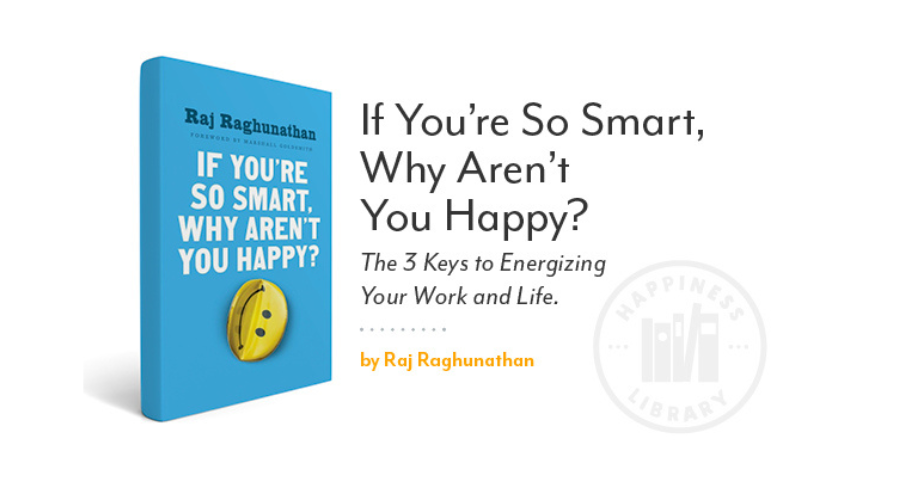Book Report: “If You’re So Smart, Why Aren’t You Happy?” Part 2

In If You’re So Smart, Why Aren’t You Happy?, psychological researcher and happiness coach Raj Raghunathan argues that happiness is our natural state. Several aspects of socialisation can lead us astray, but Raghunathan aims to remedy this by identifying the “seven deadly happiness sins” and resolving each of them with a corresponding habit of the highly happy.
Here’s the second half of our easy-to-read distillation of the book’s key arguments
– check out Part One
first if you haven’t read it yet!
Assumptions, Guesses and Pivot Tables: From Data to Discovery

How well do you know your business? Do you know how well you’re doing? What your costs are? How happy your customers are? How happy your staff are?
Happy Workplaces Have Lower Costs
Beyond making companies earn more, happy and engaged employees also help firms to significantly reduce costs.
5 questions with Gemma Beadle of Advanced Technology Services UK Ltd

Gemma Beadle is HR Manager – UK for
Advanced Technology Services UK Ltd.
ATS specialises in repair and maintenance of factory equipment, with over 3,000 people across the US, Mexico and US.
We spoke to Gemma about how she has helped to create a culture of trust – and the importance of communication.
5 questions with Nita Clarke OBE
1. Tell me a bit about yourself. I’m a former senior official with UNISON, worked for Tony Blair at No 10 2001-2007, Director of the Involvement and PArticipation Association, co-author of the Engaging for Success report 2009, and co-chair with the wonderful David MacLeod of the national Engage for Success taskforce, and proud of the movement it has spawned. 2. What’s your top tip for creating a happy and engaged workplace? It’s the people, stupid. Regard your people as the solution not the problem, have faith in them to come up with the answers to the challenges you face, listen to and respect them, and give them something to believe in. 3. Could you give me one example of how people responded to greater trust? Trust is when the values of an organisation are reflected in the behaviours and creates a culture of confidence and positivity where people feel they can speak out when things aren’t right. and come up with suggestions for improvements. 4. What have you done to create a culture of trust at your organisation? I’ve tried to empower the team at the IPA to do what they do best in their areas of expertise, while creating an atmosphere of mutuality and solidarity. 5. Could you give me an example of what you’ve done to give staff greater freedom and autonomy? No micro-managing, but plenty of team discussion about mission, strategy, and day to day operations, so everyone feels as empowered and as accountable for success as everyone else.
5 Questions With Peter Cheese of CIPD
Peter Cheese is the CEO of the
Chartered Institute of Personnel and Development (CIPD).
CIPD is the professional body for HR and people development. It is career partners to more than 140,000 members around the world, giving them the support they need to make a real impact on the work and working lives of the people and organisations they work with. Through its research, CIPD provides a point of view on creating that impact in the context of the rapidly changing world of work.
We spoke to Peter Cheese about how he has helped to create an engaged and happy workplace.
5 questions with Damien O’Neill of Advanced Technology Services UK Ltd
Damien O’Neill is Site Manager at
Advanced Technology Services UK Ltd (ATS).
ATS employs more than 3,000 people across the US, Mexico and the UK, and specialises in factory maintenance and IT services. Their company culture is centered around safety and continuous improvement, with their products winning multiple awards for innovation.
We spoke to Damien to find out more about ATS and their culture, ahead of the 2017 Happy Workplaces Conference next month.
5 questions with Simon Grosse of Foundation SP
Simon Grosse is the CEO of Foundation SP.
Foundation SP has just been awarded the UK’s Best Workplace in the Small Business Category (for organisations with between 20 to 40 staff). This is the second year running that they have been given the prestigious award.
We spoke to Simon about Foundation SP’s value-led culture to find out more.
Brand New Excel Training Course: Excel Pivot Tables
At Happy, we love Excel. No really, we do! It’s immensely powerful, full of fantastic features and can produce beautiful results. But we love it most when it’s easy – we don’t think anyone should have to spend days wrestling with Excel. So how is this new course going to change all that?




